.gif) image located by Zoltan Horvath, 4 June 2024
image located by Zoltan Horvath, 4 June 2024
Last modified: 2024-11-09 by rob raeside
Keywords: gambia | coat of arms: tools | lions: 2 | progress peace prosperity | palm tree |
Links: FOTW homepage |
search |
disclaimer and copyright |
write us |
mirrors
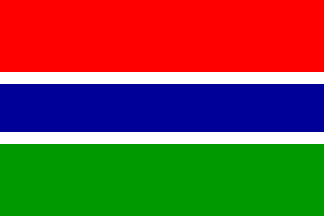 image by Zoltan Horvath, 4 June 2024
image by Zoltan Horvath, 4 June 2024
Horizontally divided flag with stripes top to bottom red, white,
blue, white, green in ratio 6:1:4:1:6.
Željko Heimer, 06 Oct 2001
Dorling-Kindersley [rya97] says this was
adopted on 18 February
1965 and Smith
[smi76]
is more precise, saying that it was «officially hoisted on
18 February
1965», which may
(or not) mean that the flag had been use before.
Ivan Sache, 06 Oct 2001
These symbols [flag and arms] were not modified during
the short-lived Senegambian Federation (1981-1989). Remember that Gambia is
enclaved within Senegal. The distance between both north and south borders
never exceeds 25 km.
Ivan Sache, 06 Oct 2001
The constitution defines the flag specification:
https://judiciary.gov.gm/sites/default/files/2021-07/Constitution%20of%20The%20Gambia.pdf#page=135
Zoltan Horvath, 4 June 2024
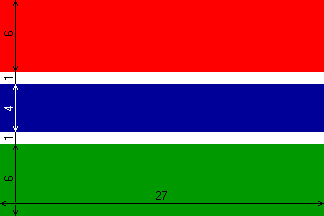 image by Željko Heimer, 6 October 2001
image by Željko Heimer, 6 October 2001The protocol manual for the
London 2012 Olympics (Flags and Anthems Manual
London 2012) provides recommendations for national flag designs. Each NOC
was sent an image of the flag, including the PMS shades, for their approval by
LOCOG. Once this was obtained, LOCOG produced a 60 x 90 cm version of the flag
for further approval. So, while these specs may not be the official, government,
version of each flag, they are certainly what the NOC believed the flag to be.
For Gambia, PMS 032 red, 293 blue, 355 green. The vertical flag is simply the
horizontal version turned 90 degrees anti-clockwise.
Ian Sumner, 11
October 2012
The Flag Manual - Beijing 2008 gives Pantone colors: PMS 032 (red), PMS 293
(blue), and PMS 355 (green).
The Album des Pavillons 2000 [pay00]
gives colors in Pantone, and CMYK systems:
Blue: Pantone 293c, CMYK
100-60-0-0
Red: Pantone 186c, CMYK 0-90-80-5
Green: Pantone 361c, CMYK
75-0-90-0
The Album des Pavillons 2023 already specifies the colors of
the flags in three color systems.
Blue: Pantone 293c, CMYK 94-73-0-0, RGB
0-71-182
Red: Pantone 186c, CMYK 14-100-79-4, RGB 200-16-46
Green: Pantone
361c, CMYK 78-0-100-0, RGB 18-173-43
Vexilla Mundi gives colors in Pantone
system: PMS 186C (red), PMS Reflex Blue C, PMS 364C (green) and PMS White.
Wikipedia
illustrate a construction sheet based on the constitution, but doesn’t give
color specification. But I found colors on teh Russian page
( https://ru.wikipedia.org),
which gives color values as follows:
Red: Pantone 186, RGB 206-17-38
Blue: Pantone Reflex Blue, RGB 12-28-140
Green: Pantone 364, RGB
28-119-40
Flag Color Codes gives color values as follows:
Red: Hex: # CE1126, RGB 206-17-38, CMYK 0-90-76-0, Pantone 032, RAL 3028
White: Hex. # FFF FFF, RGB 255-255-255, CMYK 0-0-0-0, Pantone N/A, RAL N/A
Blue: Hex: # 0C1C8C, RGB 12-28-140, CMYK 100-76-0-9, Pantone 293, RAL 5002
Green: Hex. # 3A7728, RGB 58-119-40, CMYK 93-0-100-0, Pantone 355, RAL 6001
Zoltan Horvath, 4 June 2024
Symbolism: light blue, the Gambia River that flows through
the land; red, the sun overhead; green, the land.
David Kendall, 1 October 1996
Note that a possible source for the symbolism given above is
Smith (1976) [smi76].
Ivan Sache, 6 October 2001
Dorling-Kindersley Pocket Book (1998)
[rya97] gives as symbolism of the colours:
Green is said to represent forest and red savannah.
Ivan Sache, 6 October 2001
Politikens Flagbook, 2000 [rya98a], has for the colours (translated):
Red symbolizes the savannah’s grass plains and the sun; the blue stripe stands for the River Gambia; green symbolizes the forests as well as agriculture.But in the text it says (translated):
The blue stripe symbolizes the River Gambia, which flows between the green forest and the red savannah. White stands for unity and peace.Peter Hans van den Muijzenberg, 7 October 2001
According to M. Tallocci [tal93],
the white fimbriations represent peace and purity.
Ivan Sache, 4 October 1996
The article [oaw07] says
the blue stripe, which represents the river, in the middle; the white
stripes on either side represent the lowland rice fields. The red and
green stripes at top and bottom represent the higher land - red for
laterite, green for forest.
Richard Mallett, 28 April 2007
In some sources, the interpretation of the colours is slightly
different for the coat of arms.
Ivan Sache, 6 October 2001
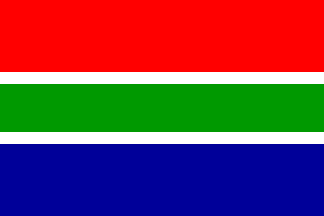 image by António Martins, 21 August 2007
image by António Martins, 21 August 2007
Gambia SG 395 (13th. anniversary of
independence 1978) which shows the flag as red-white-green-white-blue —
the article [oaw07] says.
Richard Mallett, 28 April 2007
The stamp FotW#02249 shows two scarcely
clad men trying to tip each other off a narrow rail by hitting one another
with pillows, in what seems to be a sporting competition. The said pillows
are white with a wide stripe patterned after the national flag
of Gambia, but with green and blue swapped.
António Martins, 21 August 2007
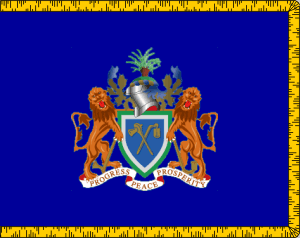 image by Zoltan Horvath, 4 June 2024
image by Zoltan Horvath, 4 June 2024
Blue flag with the coat of arms in the middle and golden
fringe along three edges. [smi82] does not
mention this flag, but [cra90k] already
describes it. Possibly it was not adopted yet in 1970 when the republic was
proclaimed, but latter on.
Željko Heimer, 6 October 2001
At the official
website, you can see parts of this flag.
Christian Berghänel, 18 December 2002
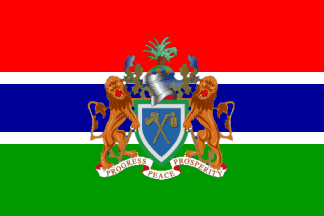 image by Zoltan Horvath, 4 June 2024
image by Zoltan Horvath, 4 June 2024The national flag defaced with the coat of
arms (approximately) of 2/3 height of the hoist.
Željko Heimer, 6 October 2001
.gif) image located by Zoltan Horvath, 4 June 2024
image located by Zoltan Horvath, 4 June 2024
Adopted in 18 November 1964.
Nozomi Kariyasu
Azure an axe and hoe Or in saltire a (double) bordure Vert then Argent.
Christopher Southworth, 2 October 2024
Wikipedia
gives a detailed blazon of the shield, crest, torse and supporters, which are
typically listed as separate items in the letters patent issued by the College
of Arms.
Tomislav Todorovic, 2 October 2024
Znamierowski [zna99]
says that the original idea of design came from Gambia and
was forwarded to the College of Arms.
Ivan Sache, 6 October 2001
In some sources, the interpretation of the colours is slightly different for the coat of arms: According to Smith [smi76],
According to this
WMO
page and book [c9h07], Gambia uses
the international system.
Jan Mertens, 8 November 2007